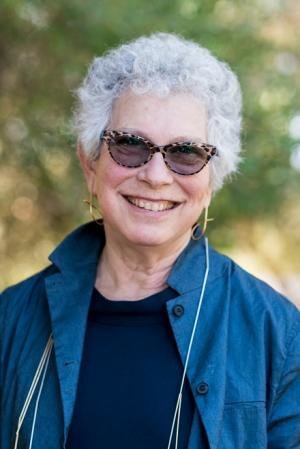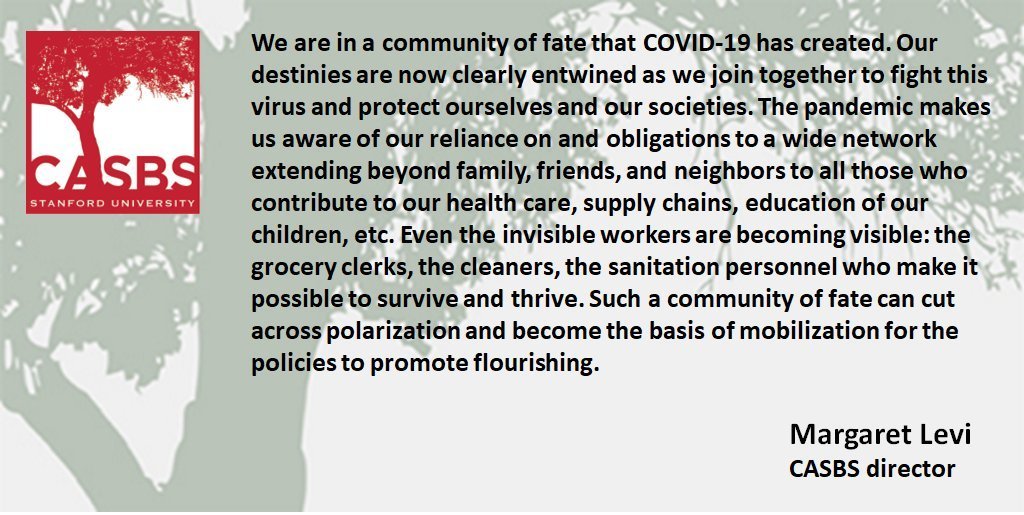
As you know, this is a very difficult period for all, CASBS included. Although we are extremely fortunate to have a great staff and, for the moment, a fairly sound financial position, we, too, have been affected by the world-wide pandemic.
We grieve with the fellows of 2019-20, who have had their treasured year of activities on the hill cut short. They – and we – have been scrambling to ensure that all are safe as they return to their homes all over the world or shelter in place in the Bay Area. We were given very short notice (less than a day) to ask them to all leave their studies, and we have worked out all kinds of arrangements so that they can continue to interact. We still have our regular research seminars, by Zoom, and a new bi-weekly town hall to discuss anything and everything. We even had a very successful social hour virtually; fellows had drinks in hand while they shared their experiences of trying to return to various points in the U.S. and the globe.
The fellows’ committee has been active in making suggestions and organizing future activities in hopes of maintaining the extraordinary camaraderie this class has established. CASBS has decided to do things to help compensate for the lost months. The first is to allow fellows who can to return for up to a month in the next academic year, on a space available basis. The second is to organize a reunion and postponed “graduation” celebration. We will use money saved from the cancellation of the famous CASBS lunches for these months to help defray some of the costs for those fellows who cannot otherwise afford to join.
CASBS associate director Sally Schroeder deserves a special shout-out here. She was creative in thinking about how to help the fellows, and she started preparing early for the staff to work remotely. But I want to emphasize that all members of staff have proved stalwart. They are performing their tasks diligently, and even those whose work depends on being at our physical location have helped in every way they can. Our virtual weekly staff meetings help us retain more personal contact as we adapt to the use of Slack, Zoom, and all other tools available. Our staff were particularly grateful that CASBS board chair Tino Cuéllar “attended” one of our virtual meetings.
With the help of Tino and our board’s vice-chair, Roberta Katz, Sally and I have begun to make contingency plans for the fall. We hope, surely as we all hope, that we will be back to “normal” by September, but that is far from certain. In March we announced the roster of the very exciting 2020-21 fellows class. Other options will come more sharply into view in the coming weeks and months. In the meantime, the incoming fellows are trying to determine their best options given that many will be renting out their own homes while taking on a lease in the area.
In addition to disruptions of the present and future classes, there is also a further delay in our building plans. Santa Clara County (in which Stanford resides) officials had begun the process of reviewing our plans, but such reviews are non-essential work and so on hold for now.
We are also being told by the Stanford administration that there will be serious belt-tightening going forward. Accordingly, we are looking carefully at all of our expenditures. One immediate effect is a freeze on hiring. We had completed our interviews of excellent candidates and chosen a very exciting replacement for the irreplaceable program director Federica Carugati, who is taking up a faculty position at King’s College London.
All is not gloom and doom, however.
- Our strategic conversations and thought experiments about “CASBS in the 21st century” have been successful and exciting. We started with the question: If we were building a center for advanced study now (as opposed to 1954), how would we structure it? We continue to work towards a set of ideas for how to make CASBS even more successful at meeting its mission of advancing understanding of significant societal challenges with first rate and cross-disciplinary thinking and scholarship.
- The Creating a New Moral Political Economy project has become even more important and urgent than it was before. Through op-eds, thought pieces, and webcasts, members of our network are engaging in the process of how best to use this crisis as an opportunity for needed changes in government and the economy. We also have asked all members of the network to respond to this prompt:
- What has changed in our economic and political structures? We’ve already pointed out the change from an industrial to a service economy. Another example is that we no longer accept GDP as the best measure of well-being. And, of course, concerns about the future of our planet have finally, if belatedly, taken their place on the reform agenda.
- What then are the implications for how we should be rethinking policies and practices?
Our intention is to use the responses to inform the working groups of the project as well as the book that CASBS program director Federica Carugati and I are writing.
Yes, this is a difficult time, but it also offers an opportunity to reflect on how we can best use the resources we have to confront the significant societal challenges of now and the future. I believe the Center has strengths that put it in a position to make real contributions to this effort.
Onward!


Read Margaret's thought piece, "Frances Perkins Was Ready!," published in Social Science Space.
* Image caption: We are in a community of fate that COVID-19 has created. Our destinies are now clearly entwined as we join together to fight this virus and protect ourselves and our societies. The pandemic makes us aware of our reliance on and obligations to a wide network extending beyond family, friends, and neighbors to all those who contribute to our health care, supply chains, educations of our children, etc. Even the invisible workers are becoming visible: the grocery clerks, the cleaners, the sanitation personnel who make it possible to survive and thrive. Such a community of fate can cut across polarization and become the basis of mobilizations for the policies to promote flourishing. Margaret Levi, CASBS director.
